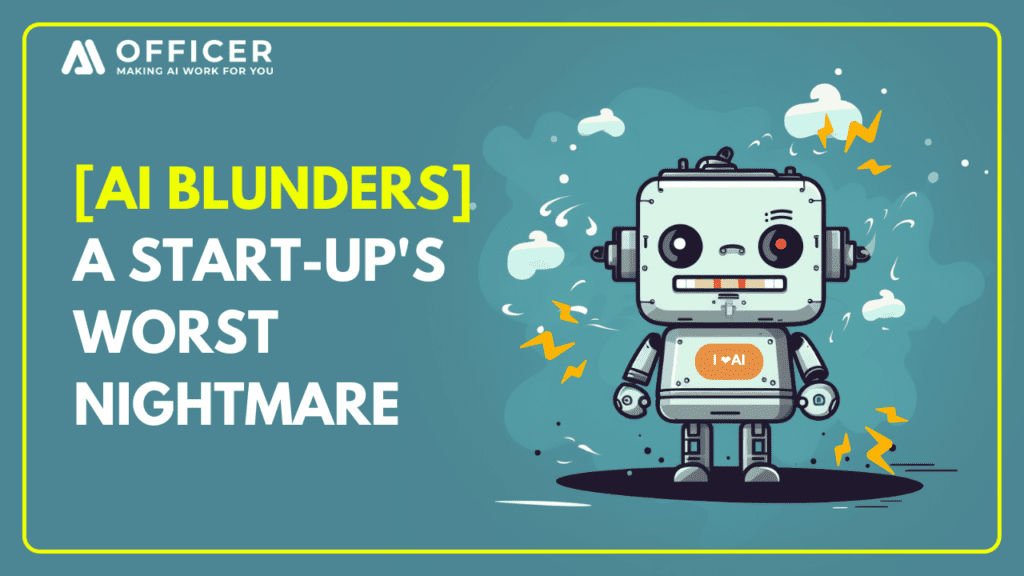
Picture this – the year is 2023, AI ISN’T THE FUTURE ANYMORE, IT’S THE NOW.
The roaring AI revolution is upon us! You’re all set to embrace this exciting world of artificial intelligence, ready to propel your start-up to the stratosphere.
But wait! Before you plunge into this vast ocean of 1’s and 0’s, let’s play a game of “What-Not-To-Do”.
AI is like Fire – Handle it well and it lights up your world; Handle it wrong and You’re Toast! The problem is, Far too many start-ups treat AI as a trendy Toy, only to realize too late that they’re dealing with a double-edged sword.
In this illuminating guide, we will explore the five biggest AI Blunders that your start-up cannot afford to make, highlighting the lessons learned and providing insights for success.
Consider this your compass in the tricky terrain of AI adoption, steering you clear from the disastrous pitfalls while you navigate towards success. Buckle up, because the ride is about to get bumpy!
1. CNET’s AI-Generated Articles with Errors and Plagiarism
CNET, a prominent technology news website, encountered a blunder when AI-generated articles contained errors and instances of plagiarism. The incident shed light on the limitations of AI in producing accurate and original content.
Lessons Learned
Quality Control : Start-ups must prioritize rigorous quality control measures to ensure the accuracy and originality of AI-generated content.
Human Oversight : Incorporating human editors or moderators can help identify and rectify errors or plagiarism that AI systems might overlook.
2. Self-Driving Tesla Causes an Eight-Car Crash
Self-driving technology has the potential to revolutionize transportation. However, Tesla faced a significant setback when one of its self-driving vehicles caused an eight-car crash. This incident highlighted the importance of ensuring the safety and reliability of AI-powered systems.
Lessons Learned
Thorough Testing : Start-ups must conduct extensive testing and validation of self-driving AI systems to ensure they meet the highest safety standards before deploying them on public roads.
Continuous Improvement : Regular updates and improvements based on real-world data and user feedback can enhance the performance and safety of self-driving AI systems.
3. Issues with Moderation of ChatGPT
ChatGPT, a widely used language model, faced scrutiny when it was revealed that moderators were paid less than $2 per hour. This raised concerns about the working conditions of human moderators and the potential impact on the moderation quality.
Lessons Learned
Ethical Considerations : Start-ups should prioritize fair compensation and ethical treatment of human moderators, as their work significantly influences the quality and safety of AI-generated content.
Transparent Moderation Policies : Clearly defining and communicating moderation guidelines and procedures can ensure consistency and prevent biases or errors in AI-generated content.
4. Racism and Prejudice in ChatGPT
Another blunder involving ChatGPT was its exhibition of racism and prejudice. This highlighted the importance of addressing biases in AI systems, as they can perpetuate harmful stereotypes and negatively impact users.
Lessons Learned
Bias Mitigation : Start-ups need to invest in robust bias detection and mitigation techniques to ensure their AI systems are fair and unbiased across different demographic groups.
Diverse Training Data : Incorporating diverse and representative training data can help reduce the risk of biased outputs from AI systems.
5. Koko App Sending AI-Generated Messages Without User Consent
The Koko app faced a blunder when it sent around 4,000 AI-generated messages to users without their consent. This violation of user privacy highlighted the importance of respecting user preferences and ensuring transparent data handling practices.
Lessons Learned
Informed Consent : Start-ups must obtain explicit user consent for any AI-generated content or interactions to respect user privacy and build trust.
Data Privacy and Security : Implementing robust data privacy measures and secure data handling practices are crucial to prevent unauthorized use or disclosure of user information.
As the AI landscape continues to evolve, learning from these blunders is essential to navigate the challenges and embrace the transformative potential of AI in a responsible manner.
Navigating the AI jungle is an Adventure.
It’s fraught with challenges, but the rewards are immense. And remember, if you aren’t sure which path to take, the AI officer is always a click away.
So take note, make the right choices, and may your AI journey lead you to success. Don’t let these blunders cost your Startup.
It’s a wild AI world out there, Survive and Thrive in it with AI Officer by your side. Share your love by following our social pages!





